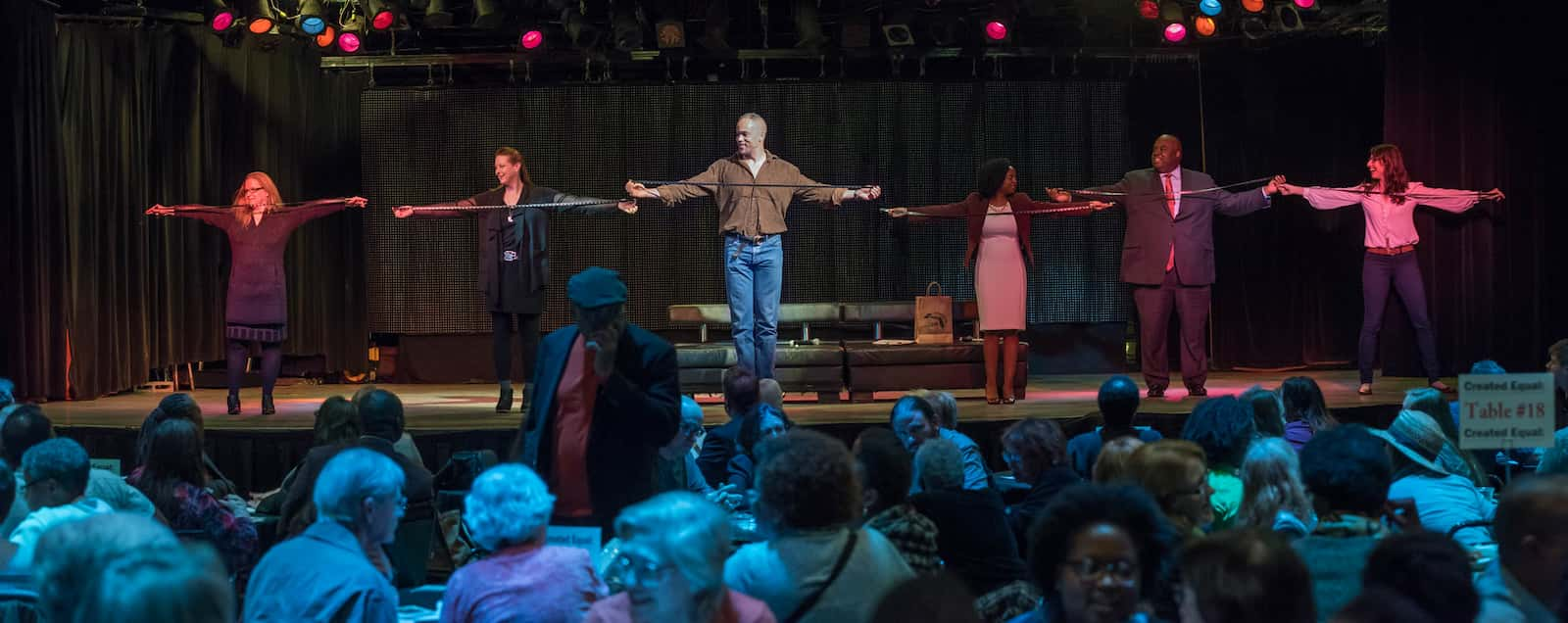The 2017 5-Foot Challenge grant was awarded to Melinda Stuart-Tilley. Learn about her project (and get involved) below. Melinda Stuart-Tilley, a Tallahassee native, is a mother, graduate student, and religious educator who is aiming for solutions to wage peace in our communities.
__________
We are recruiting law enforcement officers (active duty and retired) and people of color to participate in this project. Please complete this form if you’re interested.
What happens when we have honest conversations, tell our stories, and see each other as people first? Could we begin to change the culture – and promote peace?
Distrust and violence between law enforcement and minority communities has been a persistent problem in the United States for generations, but it has come to the forefront in recent years, due to high-profile recorded cases that garnered widespread public attention. Some of the reasons for this distrust include: systemic racism, social dislocation, a history of abuses of power from authorities against minorities, and the demographic over-representation of African-American and Hispanic males in the criminal justice system. Particularly troubling for the public is the data that minorities, especially African-American men, are disproportionately affected by harassment and abuse of power by the police. Organized citizen movements, such as Black Lives Matter, have mounted protests and campaigns to bring awareness to the plight of minority victims of law enforcement violence, highlighting unjust killings. Counter movements have defended law enforcement officers in what is seen as an attack on officers who sacrifice in order to protect and serve citizens. Tensions between the groups have been heightened after a series of incidents of police violence against unarmed and lawful citizens, and retributive violence, where law enforcement officers were arbitrarily killed. The ongoing violence potentially affects the safety and security of all, and heightens our national discord.
… when the conflict gets so bad that both sides can barely speak to each other, you need to go back to basics and have people see each other as human beings first.
There is a sharp contrast in the surveyed levels of public trust in law enforcement between minority and non-minority citizens, highlighting the racial dimension of this problem. African-American men, who are overrepresented in the criminal justice system relative to their demographic population, may be unfairly seen as potential criminals or threats by law enforcement officers. In turn, law enforcement officers are often not perceived as trustworthy to protect minority communities, and are viewed with suspicion as potential adversaries, rather than as guardians and community partners. Law enforcement officers need the trust of citizens to help them solve crimes, enforce laws, and prevent violent animosity against officers. Citizens need the trust of law enforcement to ensure equal treatment and protection under the law, and to prevent egregious violence against individuals. The underlying distrust is largely a result of several complex factors, including: systemic racism that is deeply embedded in the culture; suspicion of authority figures in traditionally marginalized communities; societal expectation of violence and reliance on firearms to mitigate conflict; and a values system that encourages aggression. When these myriad factors meet high-stress survival situations, such as a traffic stop where it is assumed that both parties are prepared to use deadly weapons, violence may ensue.
Some of the thousands of law enforcement agencies in the United States have proposed or employed policy changes in two broad categories: community policing (more police presence in neighborhoods, improved training in community relations and use of force, transparency of policies, increased racial and ethnic diversity recruitment, and other measures designed to build trust and cooperation) and greater accountability (like body cameras, and civilian review boards and prosecution for police abuse of power). All of these solutions are valuable, and may have positive effects on reducing violence and increasing goodwill between these two groups. However, to create lasting, effective change, there needs to be a cultural shift in how law enforcement and communities perceive and interact with each other. How can a national culture of trust between citizen and law enforcement be created, despite varied policies and practices from almost 18,000 law enforcement agencies in the United States? There is a potential solution that could change the culture by enabling both people of color and law enforcement officers to share their stories as peers and neighbors: the application of the hermeneutics of citizenship.
The hermeneutics of citizenship was an idea first proposed by scholar Atalia Omer, regarding the Israeli-Palestinian conflict. The idea is that when the conflict gets so bad that both sides can barely speak to each other, you need to go back to basics and have people see each other as human beings first. You do this humanizing, essentially, by people telling their stories, which is part of the universal experience of humanity. That evokes sympathy and mutual trust, paving the way for people to work out issues and come to a common solution: in this case, how to keep all people involved safe, and to promote lasting relationships of mutuality. Simply put: you get to know and feel for someone, and you go back and tell your friends and colleagues about your experiences, and you change the culture, bit by bit.
This is where the “Culture of Trust” workshop comes in. In addition to solutions in training, policy, and accountability measures, we need to attempt to change the culture. To change the culture, we need to increase trust. To increase trust, we need to increase empathy and honest, real communication. What if we put twelve strangers in a room for one day – six members of law enforcement, and six civilians of color – and tried to see if they could change their perspectives about each other?
________
We are recruiting law enforcement officers (active duty and retired) and people of color to participate in this project. Please complete this form if you’re interested.

